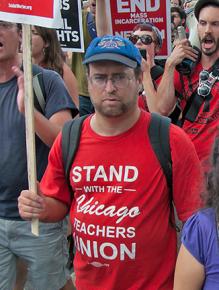Wearing our solidarity proudly
, a teacher in Rhode Island, talks about his experiences at the March on Washington and what he learned from them for the struggles ahead.
THIS WEEKEND'S March on Washington was a fantastic and exhilarating event.
Honestly, I did not get to hear any of the speeches. They might have been pretty horrible--I imagine Eric Holder had nothing useful to say--and it will make a difference to the movement how the leaders from the front direct it. It's not irrelevant for socialists to discuss and analyze this.
But what was inspiring was the solidarity you could feel building among the people who went--from getting on the bus, to stopping at the rest stops in Connecticut and Delaware, to the march itself. I had a particular experience of this because of the bright red t-shirt I happened to be wearing, which said: Stand with the Chicago Teachers Union.
Numerous times, people stopped me to ask if I was a Chicago teacher--clearly, something they admired and respected. Let me tell you: as a teacher, it is not often that people stop you in public and express their solidarity or sympathy, much less respect.
The difference here was that I was in a crowd that understood that the Chicago teachers went on strike not just for themselves, but for their students--the majority Black and Brown students whose schools were closed by Chicago Mayor Rahm Emanuel. They understood that the union was supporting the community, and they, the community, supported the union.
Somewhere around 3 a.m. on Saturday morning, the bus stopped at the Delaware House, a massive shiny Interstate rest stop in the smallest state (well, except my own). The men's room was slightly crowded (but no line--under socialism, we'll massively expand women's restrooms). A man washing his hands asked if I was a Chicago teacher as I approached the urinal. No, I'm a Rhode Island teacher, but I think what the Chicago teachers did with their strike, and engaging with the community before and after, is a model that all teachers' unions should follow.
Another man who was brushing his teeth at the sink rinsed out his mouth and asked: "Don't you think principals, at least, should be armed?"
"Look," I said, "we have a cop assigned to the school already..."
"But cops never get there fast enough," he said.
"But the cop is stationed in the school full time, and it's not helpful," I said. "Did you hear about the woman at that school in Georgia that stopped that guy from shooting up the school?"
I wasn't about to convince this man brushing his teeth at a rest stop at 3 a.m. that we don't need guns in school, much less that we need a socialist transformation of our world. But the molecular processes involved in a mobilization like this, in every moment of it--from the build-up to the trip to the event and beyond--is what gives me hope for the future. It's what sustains me as an activist and a socialist.
Who knows when the ideas will come to fruition, when those few comments will resurface and that man will begin to see things differently--perhaps never. And frankly, who knows how or when the experiences and ideas of the people I traveled with and encountered will illuminate parts of the struggle for me (some of them already have). But the arc of history bends toward justice, and the arc of our moment is bending toward radicalization and enlightenment.
As we got off the bus at 6:30 a.m., a reporter from the Bay State Banner, the African-American newspaper in Massachusetts, stopped me and commented on my shirt. She wanted to interview me: why did I, a white teacher, choose to attend the March? Why did I think it was important? What was the connection with Chicago? And could she take a picture of the shirt, both sides?
I DON'T know where the movement is going from here. It looks to me like the Obama administration may get off the hook and not press federal civil rights charges against Zimmerman. It also looks like much of this energy will be channeled into voting rights and voter registration--only to be funneled back into the Democratic Party in 2016 (ready for Hillary!).
In my city, we've made some important connections--but the Black leadership here is still weak and has a lot to do to connect with the community. Right now, I think we can hold discussions, do film screenings, carry on study groups around The New Jim Crow and other books, and write about the numerous, minute manifestations of racism in our city.
I think it's likely somewhat different elsewhere, in cities where the Black community is better organized and where there are ongoing struggles for justice for the victims of police brutality, for prisoners, against school closings, etc. There is still a long walk ahead of us to reach a place where we can say there is a coherent national movement.
Socialists have already made important contributions to this movement, from our ideas, to organizing buses, to raising important chants at the march. But we should also learn a lesson here: when we can connect our experience as teachers, as workers, to the struggle against racism; when we can explain our politics not through formulas we've read in books, but through our own stories; when we reach a point where we can lead our unions into antiracist struggles and show in practice what a multiracial workers' movement can do to end racism; then socialist ideas and organization will be relevant to masses of people, and those masses will make socialist ideas into a material force to be reckoned with.
In the meantime...be sure to wear your red Stand with the Chicago Teachers Union t-shirt.
First published at Rhode Island Red Teacher.



